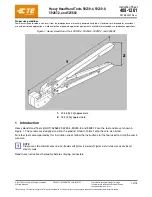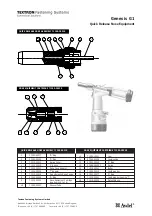
1
2
3
DIE SET INSTALLATION
1. Remove die screws (see figure 1) from
frame with allen wrench. A wrench and a
set of spare die screws are provided with
each die set.
2. Insert die sets into frame, and install die
screw. Close handles an tighten screws
with wrench. Make sure dies are properly
aligned.
3. Check the preload according to the ins-
tructions below, and adjust if necessary.
ADJUSTING THE PRELOAD
1. Check preload by closing the tool with
the die set installed, but without crimping
a connector. The force that you apply on
the handles 40 mm (1.57”) from the end
of the handle (see figure 1) should be
approximately 35 – 45 pounds. This is
the factory setting.
2. If adjustment is needed, remove the screw
from the eccenter axle.
3. Remove the plastic washer, and the
toothed washer.
4. Turn the eccenter clockwise to loosen and
counter-clockwise to tighten. Position 9
is tightest, position 1 is loosest.
5. Replace the toothed washer, plastic
washer and screw.
6. Check the preload.
MONTAGE DES MATRICES
1. Retirer les vis de blocage des matrices
(voir figure 1) avec une clé allen. Une clé
et 2 vis sont fournies avec chaque jeu de
matrices.
2. Insérer les matrices dans la pince et placer
les vis. Fermer la pince et serrer les vis
avec la clé. Assurez-vous que les matrices
sont bien alignées.
3. Contrôler la presion de serrage suivant les
instructions ci-après, et ajuster si néces-
saire.
AJUSTEMENT DE LA
PRESSION DE SERRAGE
1. Contrôler la pression en fermant la pince
équipée des matrices, mais sans connec-
teur. La force que vous devez appliquer
à 40 mm de l’extrémité des manches
(voir figure 1) doit être de 35 – 45 livres.
Règlage d’usine.
2. S’il est nécessaire d’ajuster, retirer la vis
de l’axe excentrique.
3. Enlever la rondelle plastique et la ron-
delle crantée.
4. Tourner l’excentrique dans le sens des
aiguilles d’une montre pour déserrer, et
en sens inverse pour serrer. La position 9
est la plus serrée, la position 1 la moins
serrée.
5. Replacer la rondelle plastique puis la
vis.
6. Recontrôler la pression.
CRIMPING INSTRUCTIONS
PROCEDURE DE SERTIS-
Risk of
ELECTRIC SHOCK
Do not use this tool on a live wire.
1. Insulated and noninsulated terminals
(Die sets No. D-100, D-101, D-100A,
complete tools No. ECP-100,
ECP-101, MIC 2616)
Open the tool. Place the terminal into the
correct die nest, (1).
Partially close the tool until the terminal
is held in place. Insert the wire into the
terminal, (2).
Close the tool until the RATCHET RE-
LEASES, (3).
Remove the crimped terminal, (4).
SAGE
1. Cosses isolées et non isolées (Matri-
ces Nº D-100, D-101, D-100A, pince
complète Nº ECP-100,
ECP-101, MIC 2616)
Ouvrir la pince en serrant les poig-
nées à fond et placer la connexion dans
l’empreinte correspondante, (1).
Fermer la pince de manière à maintenir
la connexion sans l’écraser et insérer le
fil adapté dans celle-ci, (2).
Serrer les poignées jusqu’au DECLEN-
CHEMENT DE LA CREMAILLERE,
(3).
AVERTISSEMENT
N’utilisez pas cet outil pendant des
travaux avec des fils sous tension!
3. Open barrel contacts (Complete tools
No. ECP-112, MIC-3020BL)
Open the tool. Place the terminal into the
correct die nest, (1).
Partially close the tool until the terminal
is held in place. Insert the wire into the
terminal, (2).
Close the tool until the RATCHET RE-
LEASES, (3).
Remove the crimped terminal, (4).
4. Fiber optic connectors (Die set No.
D-109, complete tool No. ECP-109).
Please follow the instructions recommen-
ded for your connector.
Contacts à fût ouvert (Pince complète
Nº ECP-112, MIC-3020BL)
Ouvrir la pince en serrant les poignées
à fond et placer la connexion dans
l’empreinte correspondante, (1).
Fermer la pince de manière à maintenir
la connexion sans l’écraser et insérer le
fil adapté dans celle-ci, (2).
Serrer les poignées jusqu’au DECLEN-
CHEMENT DE LA CREMAILLERE,
(3).
Ouvrir la pince et retirer la connexion
sertie, (4).
4. Connecteurs pour fibre optique (Ma-
trice Nº D-109, pince complète
Nº ECP-109).
CRIMPING INSTRUCTIONS
PROCEDURE DE SERTIS-
Risk of
ELECTRIC SHOCK
Do not use this tool on a live wire.
AVERTISSEMENT
N’utilisez pas cet outil pendant des
travaux avec des fils sous tension!
CRIMPING INSTRUCTIONS
Risk of
ELECTRIC SHOCK
Do not use this tool on live wire.
ATTENTION - Ne jamais sertir un embout sans le fil
approprié.
PROCEDURE DE SERTISSAGE
AVERTISSEMENT
N’utilisez pas cet outil pendant des
travaux avec des fils sous tension!
UNIVERSAL CRIMPING TOOL FOR
WIRE FERRULES
22-10 AWG (0,5-6 mm²)
Wire ferrules from 22-10 AWG (0,5-6 mm²) can be crimped to
the appropriate stranded wires with the universal tool without
adjustment of the tool.
Match the right wire ferrule to the correct wire to ensure a high
quality connection, both electrically and mechanically.Strip the
wire to a length that completely fills the wire barrel with copper
strands and the wire is visible at the end of the wire ferrule.
Open the tool. Place the wire ferrule between the crimping
jaws. (1)
Close the tool handels until the
RATCHET RELEASES,
then open the handles. (2)
Remove the crimped terminal. (3)
ATTENTION!
To release the ratchet prior to full closure of the tool, push
the trigger in the direction indicated by the arrow. (4)
CAUTION - Never crimp a wire ferrule without first
inser-ting the appropriate wire into the connector.
PINCE À SERTIR UNIVERSELLE
POUR EMBOUTS DE CÂBLES DE
22-10 AWG (0,5-6 mm²)
Cet outil permet de sertir les embouts de câble de 22-10 AWG
(0,5-6 mm²) pour les câbles souples correspondants, sans
réglage de l’outil.Choisir l’embout de câble adapté a`la section
du câble, afin d’obtenir la meilleure connexion possible,
électrique et mécanique.Dénuder le câble sur une longueur
suffisante pour remplir com-plètement le fût avec les brins de
cuivre, et pour que le câble apparaisse à l’extrémité de
l´embout.
Ouvrir l’outil. Placer l´embout dans l´empreinte de
sertis-sage. (1)
Refermer l’outil jusqu’au déclenchement de la
crémaillère. Ouvrir la pince. (2)
Enlever l’embout serti. (3)
ATTENTION!
Pour débloquer la crémaillère, pousser sur le levier dans
le sens de la flèche. (4)
ATTENTION - Ne jamais sertir un embout sans le fil
approprié.
(Complete tool No. MICPZD3)
(Outil complet No. MICPZD3)




















